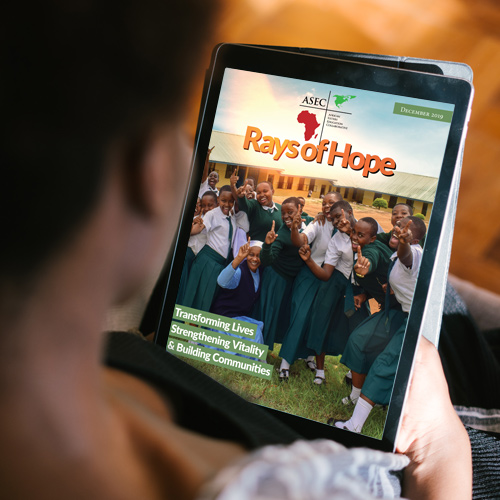One of our favorite trends for the year? Nuns on Tiktok! Since reading the New York Times article about the trend this spring, we've been enjoying seeing sisters near and far sharing their stories. Not only is it wonderful to celebrate the work of women religious on social media, it is also a great way for sisters to be seen for the ways they help their communities and show their dedication to God. One nun in Los Angeles even has 161,000 followers! She uses her platform to bring awareness to the lives of sisters and help keep the tradition alive.
On TikTok there is plenty of content created and posted by women religious – some are short videos of sisters offering helpful life advice, some are of sisters dancing and singing, and another even features sisters playing basketball. A particular favorite trend is nuns doing funny things with the caption, “When you are late to prayer.” In one viral video, three sisters in formation are seen jumping at the beginning of their religious journey and then landing, in a video trick, on the day they take their vows. (I have been unable to find this video again, if anyone does, sent it our way!)
The videos have given sisters a welcome visibility to enter mainstream media and showcase their missions, their personalities, and the importance of their work. While some videos are serious and some are silly, they seem to help viewers feel connected to them, their humanity, and their gifts, while also spreading the word of God.
Social media use has been a topic of discussion at ASEC and amongst sisters who partake in our programs, especially those in countries where they have not had a ton of exposure to different platforms or apps. Recently, sisters in our Sisters Leadership Development Initiative (SLDI) program participated in a Basic Technology workshop where they learned how basic technologies can aid them in their studies and ministries. Some things they learned were setting up social media pages, creating email accounts, and how to use applications like Google Docs or Microsoft Word to help stay organized. Some wrote letters via social media to give thanks and we wrote about it here.

Read Rays of Hope
Learn more about Catholic Sisters transforming poor, rural communities across Africa in our FREE Rays of Hope ebook.
Read It Now »
Sisters use mobile phones to fill in evaluation forms during HESA Orientation in Morogoro, Tanzania.
During a meeting with Executive Director Sr. Draru Mary Cecilia, LSMIG, Ph.D., participants in SLDI explained how recent workshops in basic computer technology have opened new doors for their congregations and ministries, even if it can be a bit intimidating at first.
Sr. Pasca Mary, an SLDI student from Tanzania, expressed that she was a bit intimidated by the use of social media in the past. She felt unsure of its goodness in the world and if it is something that should be utilized. She explained that after the Basic Technology workshop she understood how to use it in a positive way. Through education she felt empowered to understand that social media, when used in an appropriate way, can give voice to sisters.
She expressed,
“When I think of social media, I was having the wrong notion of it, feeling that being religious we were not able to get into more because it is not good for your life. But now our teachers have made more impact and to handle it wisely and prudently.”
It makes sense to feel this way and to be skeptical about the use of social media, but as Sr. Pasca mentioned, with education it can be used wisely. Other discussions have brought forth the notion that social media is a way for congregations to show the public the work they are really doing, work that the rest of the world doesn’t often get access to see.
This has been true for ASEC sisters and the congregations they represent. One noteworthy example would be the trainings by Sr. Teresa Mulenga, who is a member of Sisters of St. Theresa of the Child Jesus (Teresian Sisters) and ASEC Coordinator for Malawi, gives to members of her congregation and community members about how to use crop wastes as fertilizer and fuel. Her important work was able to be shared via Instagram in a story which featured information on the process and why it is important to the safety and security of residents of Malawi. Not only that, but those in the United States and other countries were able to learn valuable information about sustainability and the dedication sisters put forth to use resources available to support basic needs.

Sr. Ayumbi Ndeng, the representative for her class in Cameroon, works on an assignment as a part of the SLDI program in 2021.
Whether it is sharing pictures of recent events on Facebook or a sister dancing on TikTok, it sure feels great to see the visibility of sisters. But equally as important, if not more, is the way women religious are using all forms of basic technology to aid in keeping records, applying for grants, and more.
Another participant of the Basic Technology workshop, Sr. Alice, explained the different applications that will be useful for them in collaboration:
“We talked about Facebook and how to create an account, create posts, and how to create a Facebook page. We talked about Instagram, Whatsapp, YouTube, and even how to upload our videos on YouTube. We also talked about Google Docs, Sheets, Slides, and which are good for surveys. We also learned a lot about online collaboration platforms, which is very useful in our society these days.”
To think of how amazing the work has been from sisters without access to new technologies, the aid in education and empowerment of these skills will surely give them a hopefully smoother ride. If nothing else, it will allow them to communicate, organize, share and create, all great resources for important community work.








